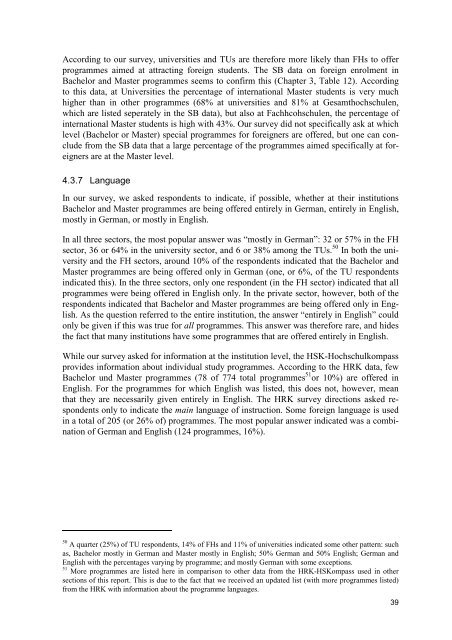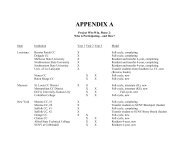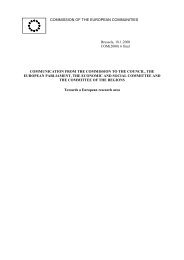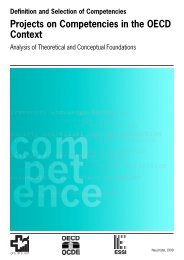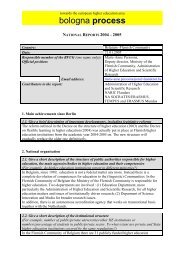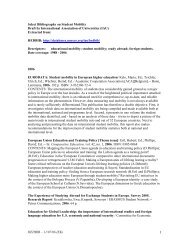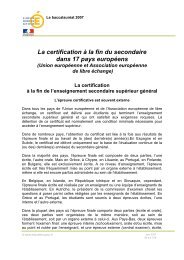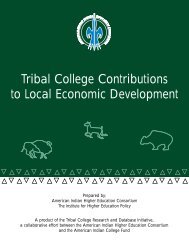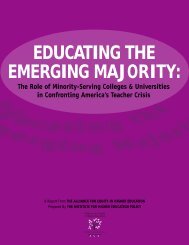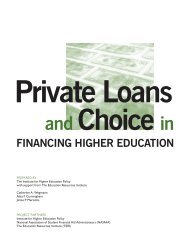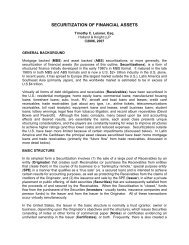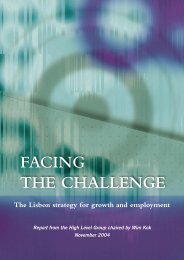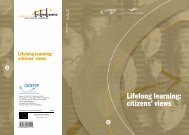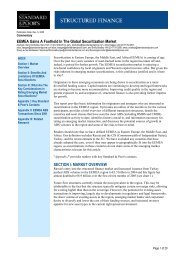and Master Programmes in German Higher Education Institutions
and Master Programmes in German Higher Education Institutions
and Master Programmes in German Higher Education Institutions
- No tags were found...
You also want an ePaper? Increase the reach of your titles
YUMPU automatically turns print PDFs into web optimized ePapers that Google loves.
Accord<strong>in</strong>g to our survey, universities <strong>and</strong> TUs are therefore more likely than FHs to offerprogrammes aimed at attract<strong>in</strong>g foreign students. The SB data on foreign enrolment <strong>in</strong>Bachelor <strong>and</strong> <strong>Master</strong> programmes seems to confirm this (Chapter 3, Table 12). Accord<strong>in</strong>gto this data, at Universities the percentage of <strong>in</strong>ternational <strong>Master</strong> students is very muchhigher than <strong>in</strong> other programmes (68% at universities <strong>and</strong> 81% at Gesamthochschulen,which are listed seperately <strong>in</strong> the SB data), but also at Fachhcohschulen, the percentage of<strong>in</strong>ternational <strong>Master</strong> students is high with 43%. Our survey did not specifically ask at whichlevel (Bachelor or <strong>Master</strong>) special programmes for foreigners are offered, but one can concludefrom the SB data that a large percentage of the programmes aimed specifically at foreignersare at the <strong>Master</strong> level.4.3.7 LanguageIn our survey, we asked respondents to <strong>in</strong>dicate, if possible, whether at their <strong>in</strong>stitutionsBachelor <strong>and</strong> <strong>Master</strong> programmes are be<strong>in</strong>g offered entirely <strong>in</strong> <strong>German</strong>, entirely <strong>in</strong> English,mostly <strong>in</strong> <strong>German</strong>, or mostly <strong>in</strong> English.In all three sectors, the most popular answer was “mostly <strong>in</strong> <strong>German</strong>”: 32 or 57% <strong>in</strong> the FHsector, 36 or 64% <strong>in</strong> the university sector, <strong>and</strong> 6 or 38% among the TUs. 50 In both the university<strong>and</strong> the FH sectors, around 10% of the respondents <strong>in</strong>dicated that the Bachelor <strong>and</strong><strong>Master</strong> programmes are be<strong>in</strong>g offered only <strong>in</strong> <strong>German</strong> (one, or 6%, of the TU respondents<strong>in</strong>dicated this). In the three sectors, only one respondent (<strong>in</strong> the FH sector) <strong>in</strong>dicated that allprogrammes were be<strong>in</strong>g offered <strong>in</strong> English only. In the private sector, however, both of therespondents <strong>in</strong>dicated that Bachelor <strong>and</strong> <strong>Master</strong> programmes are be<strong>in</strong>g offered only <strong>in</strong> English.As the question referred to the entire <strong>in</strong>stitution, the answer “entirely <strong>in</strong> English” couldonly be given if this was true for all programmes. This answer was therefore rare, <strong>and</strong> hidesthe fact that many <strong>in</strong>stitutions have some programmes that are offered entirely <strong>in</strong> English.While our survey asked for <strong>in</strong>formation at the <strong>in</strong>stitution level, the HSK-Hochschulkompassprovides <strong>in</strong>formation about <strong>in</strong>dividual study programmes. Accord<strong>in</strong>g to the HRK data, fewBachelor und <strong>Master</strong> programmes (78 of 774 total programmes 51 or 10%) are offered <strong>in</strong>English. For the programmes for which English was listed, this does not, however, meanthat they are necessarily given entirely <strong>in</strong> English. The HRK survey directions asked respondentsonly to <strong>in</strong>dicate the ma<strong>in</strong> language of <strong>in</strong>struction. Some foreign language is used<strong>in</strong> a total of 205 (or 26% of) programmes. The most popular answer <strong>in</strong>dicated was a comb<strong>in</strong>ationof <strong>German</strong> <strong>and</strong> English (124 programmes, 16%).50 A quarter (25%) of TU respondents, 14% of FHs <strong>and</strong> 11% of universities <strong>in</strong>dicated some other pattern: suchas, Bachelor mostly <strong>in</strong> <strong>German</strong> <strong>and</strong> <strong>Master</strong> mostly <strong>in</strong> English; 50% <strong>German</strong> <strong>and</strong> 50% English; <strong>German</strong> <strong>and</strong>English with the percentages vary<strong>in</strong>g by programme; <strong>and</strong> mostly <strong>German</strong> with some exceptions.51 More programmes are listed here <strong>in</strong> comparison to other data from the HRK-HSKompass used <strong>in</strong> othersections of this report. This is due to the fact that we received an updated list (with more programmes listed)from the HRK with <strong>in</strong>formation about the programme languages.39


